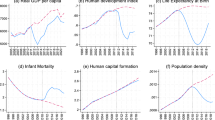Abstract
Asia is the world's most rapidly developing region. Even so, the majority of Asian nations continue to experience slow-moderate levels of economic growth, high rates of inflation, rapid population growth, and comparatively high levels of ethnic tension and civil unrest. Comparatively weak levels of intra-regional cooperation on a broad range of social, political, economic, and environmental factors contribute to the asynchronous nature of Asia's contemporary development trends. Poverty remains the most dominant feature of development throughout the region.
Similar content being viewed by others
References
AdamsN.: 1993, World's Apart: The North/South Divide and the International System (Zed Books, London).
Brandt Commission: 1980, North-South: A Programme for Survival, Report of the Independent Commission on International Development Issues (Pan Books, London).
Brandt Commission: 1983, Commission Crisis, North-South: Co-operation for Recovery (Pan Books, London).
BroganPatrick: 1990, The Fighting Never Stopped (Vintage Press, New York).
Economic and Social Commission for Asia and the Pacific (ESCAP): 1988, The Jakarta Plan of Action on Human Resources Development (United Nations, Bangkok).
Economic and Social Commission for Asia and the Pacific (ESCAP): 1990, Major Issues Relating to a Regional Social Development Strategy for Asia and the Pacific: A Conceptual Framework (United Nations, Bangkok), ST/ESCAP/902.
Economic and Social Commission for Asia and the Pacific (ESCAP): 1991, Proceedings, Fourth Asian and Pacific Ministerial Conference on Social Welfare and Social Development (United Nations, Bangkok), ST/ESCAP/1070.
Economic and Social Commission for Asia and the Pacific (ESCAP): 1992a, Towards a Regional Social Development Strategy: The Regional Social Situation and Alternative Policy and Planning Responses (United Nations, Bangkok).
Economic and Social Commission for Asia and the Pacific (ESCAP): 1992b, Social Development Strategy For the ESCAP Region Towards the Year 2000 and Beyond (United Nations, Bangkok), ST/ESCAP/1124.
EstesRichard J.: 1984, The Social Progress of Nations (Praeger, New York).
EstesRichard J.: 1988, Trends in World Social Development (Praeger, New York).
EstesRichard J.: 1990, ‘Social development under different political and economic systems’, Social Development Issues 13(1), pp. 5–29.
EstesRichard J.: 1993, ‘Toward sustainable development: From theory to praxis’, Social Development Issues 15(3), pp. 1–29.
Estes, Richard J.: 1995a, ‘Social development trends in Latin America’, (in press).
EstesRichard J.: 1995b, ‘Social development trends in Africa’, Social Development Issues 17(1), pp. 18–47.
GoodmanDavid and MichaelRedclift (Eds.): 1991, Environment and Development: the Politics of Sustainability (Manchester University Press, New York).
Human Rights Watch/Asia (HRW/A): 1994, Human Rights and the APEC Summit: 1994 (Human Rights Watch, New York).
HumanaCharles: 1992, World Human Rights Guide (Facts on File, New York).
JunJong S. (Ed.): 1994, Development in the Asia Pacific Region: A Public Policy Perspective (W. de Gruyter, New York).
NafzigerE. Wayne: 1990, The Economics of Developing Countries, 2nd edn. (Prentice Hall, Englewood Cliffs NJ).
PielGerard: 1992, Only One World: Own to Make and to Keep, (W.H. Freeman, New York).
RossMarc H.: 1993, The Culture of Conflict: Interpretations and Interests in Comparative Perspective (Yale University Press, New Haven).
SeagerJoni and AnnOlson: 1986, Women in the World: An International Atlas (Simon and Shuster, New York).
SchwefelDetlef et al.: 1990, Economic Aspects of AIDS and HIV Infection (Springer-Verlag, New York).
SimoneVera: 1994, The Asian Pacific: Political and Economic Development in a Global Context (Longman Publishing Group, New York).
United Nations: 1989, Prospects of World Urbanization, 1988 (ST/ESA/SER.A/112, New York).
United Nations: 1992, Women in Politics and Decision-Making in the Late Twentieth Century (Martin Nijhoff, Netherlands).
United Nations Children's Fund (UNICEF): 1993, The State of the World's Children, 1993 (New York).
United Nations Development Programme (UNDP): 1994, Human Development Report, 1994 (Oxford University Press, New York).
VickersJeanne: 1991, Women and the World Economic Crisis (United Nations Non-Governmental Liaison Service, New York).
World Bank: 1990, World Development Report, 1990. Special issue on global poverty (World Bank, Washington).
World Bank: 1994, World Development Report, 1994, (World Bank, Washington).
World Resources Institute (WRI): 1994, World Resources, 1994–1995 (Oxford University Press, New York).
Author information
Authors and Affiliations
Rights and permissions
About this article
Cite this article
Estes, R.J. Social development trends in Asia, 1970–1994. Social Indicators Research 37, 119–148 (1996). https://doi.org/10.1007/BF00315525
Accepted:
Issue Date:
DOI: https://doi.org/10.1007/BF00315525




